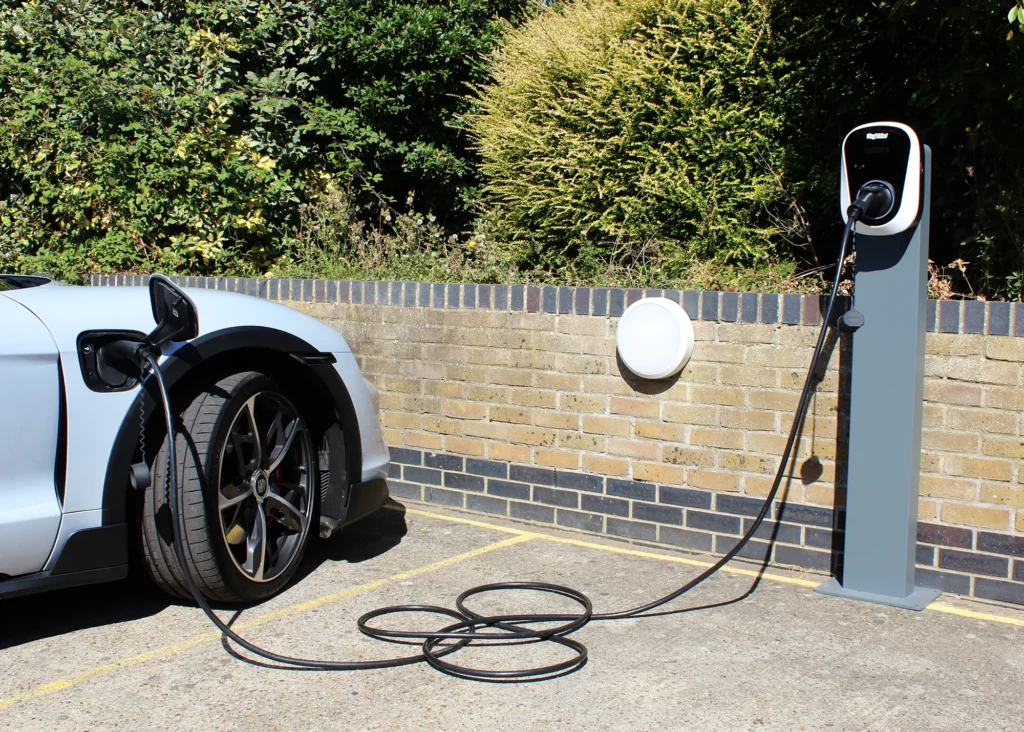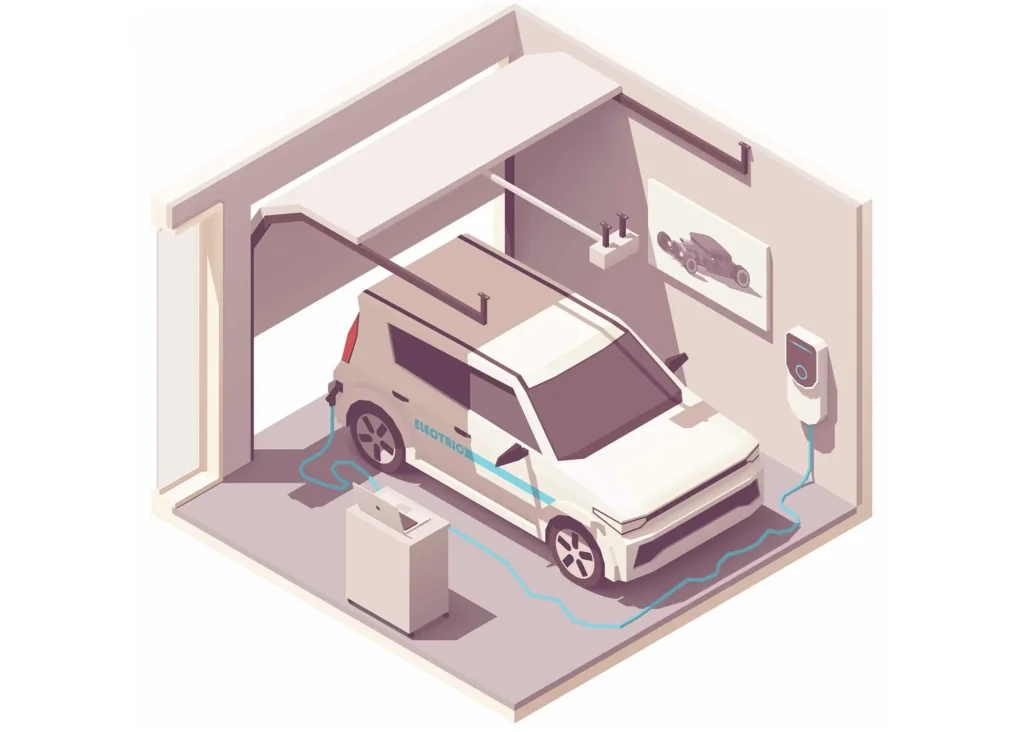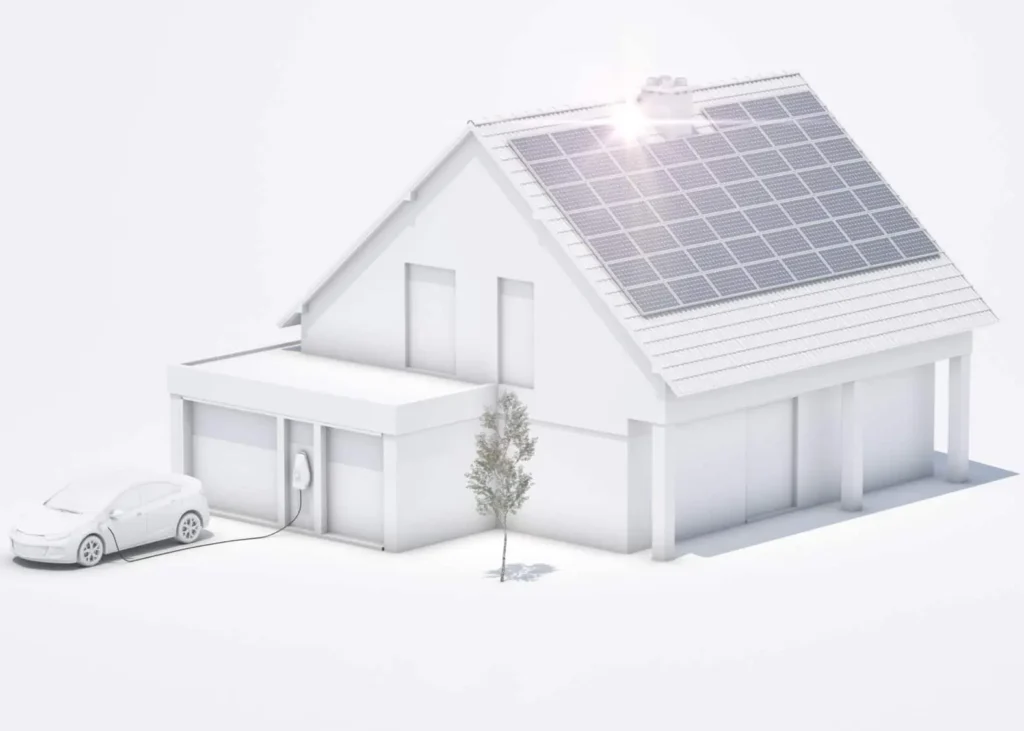
Use code BUILD for 20% off
Book here!
Use code BUILD for 20% off
Book here!Electric vehicles (EVs) are becoming more and more popular, and they’re playing a large role in the move towards a low-carbon future. But how can you charge your electric vehicle at home and why should this be a priority for you when purchasing an EV?
Charging an electric vehicle at home via a dedicated EV charging point rather than using public outlets will ensure you’re able to maximise your setup’s efficiency and make use of cost-saving, smarter features. This will mean that over time, you’re able to save money and tailor your charging scheme to your exact requirements.
So, what’s involved? Here we’re taking a look at how to go about installing an EV charging point at home, how much it will cost and how much money you can save in the long-run with a successful setup.
The first course of action when installing an EV charging point will be to identify your electrical circuit’s supply – whether that’s single-phase or three-phase. “Most households will have a single-phase power supply, but an electrician can survey your home if you’re unsure,” says Matthew Gibbons, managing director of Plug&Drive.
A single-phase supply will suit most EVs and chargers, with higher-power, larger vehicles being the exception. But there are plenty of chargers on the market to suit EVs and hybrid vehicles, whatever the supply type. Some smart models can be managed via an app to maximise the charger’s efficiency and delegate electricity supply.

EV charging points should be elevated from the ground to avoid any damage. Shown here is Plug&Drive’s EV charging point mounted on a podium for easy access
Finding an experienced installer will be key to a successful setup. “Ensure your installer has been approved by the Distribution Network Operator (DNO) and has notified them of the EV charger’s installation,” says Yen Dai, director at Eco Energy Environment. EV chargers mean a greater electricity consumption, so the DNO will be able to ensure the local network can accommodate the supply. Skipping this step can lead to costly complications later down the line – potentially requiring you to remove your charger.
Think about your EV charger’s location, too. Self building will mean you’re able to design your EV charging point in from the get-go, but renovations will require you to look at your fuse box and home’s location/layout – your charger should be positioned at least 2m from the road.
You’ll also need to ensure you have off-street parking, such as a driveway or road-side parking space where you’re guaranteed a space. If you don’t have a designated parking spot you should check the rules with your local council. Your charger will need to be at least 75cm from the ground to avoid any water damage, too.
More Ideas: Driveway Ideas: How to Add Kerb Appeal to Your Home’s Entrance
Will the Government Help?The government has incentivised the use of electric vehicles over the years with grants – the most recent update means you can get either £350 or 75% (whichever is lower) off the total cost of buying and fitting an EV charging point. “Your installation must be completed by an OZEV-approved installer with an OZEV-approved charging point,” says Matthew from Plug&Drive. Click here to find out more |
There are plenty of options for all budgets and power supplies – whether you’re hooking it up to a solar PV array or looking for smart models with rapid charging times. “Budget chargers can start from as low as £300, rising to upwards of £1,000 for smart models,” says Matthew.
It’ll be important to factor in installation, too, and ensuring that your consumer unit can handle the demand – most EV chargers will need their own breaker in a fuse box. “In addition to the EV charger itself, expect to pay upwards of £350 for a standard home installation,” says Matthew. “This will vary depending on the distance from your power supply and how extensive the electrical works are.” Consider the potential savings, too.
According to Octopus Energy, an electric vehicle costs an average of £1,742 per year to run – which is 21% less than a petrol vehicle (coming in at £2,205 per year). So, over the course of a year, an electric car could save you an average of £463 in running costs.

Domestic EV charging points can be installed indoors or out. Image: iStock.com/Sven Loeffler
EVs can be charged safely overnight and will be ready to use in the morning, which is perfect for those with busy lifestyles who can just get up and go without having to fill their car up at a petrol station.
“The best way to charge an EV is on an off-peak tariff, which will mean tapping into cheaper electricity prices throughout the night,” says Yen. “Just be wary that some of these off-peak tariffs have higher standing charges.”
Solar photovoltaic (PV) panels are a popular addition for self builds or eco renovations. “If you have solar panels, then you should opt for a smart EV charger as this will allow you to maximise efficiency,” says Yen. “You’ll be able to control how your energy is being used and only charge the EV once your home’s needs have been met, otherwise it’ll be treated like any other household appliance.”
Learn More: Solar PV Panels: Complete Guide to Home Solar Electricity

Charging an electric car at home with power from domestic solar panels. Image: iStock.com/tarras79
However, fitting PV purely to power an electric vehicle is not necessarily an efficient solution, as there’s often a disconnect between generation and usage. “If your car is sat on the driveway during sunlight hours then charging directly from solar PV is okay, but not if you’re out during the day,” says Yen. “It’s not really a logical sequence to get excited about solar panels because of EV chargers – the benefits of PV for your wider household should be the first consideration.”
Some may consider installing battery storage and charging the EV overnight with energy generated by solar panels, and stored for later use. Solar batteries are costly to purchase and install, however, and are unlikely to match an EV’s demand, which could be up to 50kWh. “It makes more sense financially to invest in a smart charger to improve how you use surplus power from your solar array, or make use of cheaper off-peak tariffs at night,” says Yen.
This article was first published in November 2021 and has been updated with new content in November 2023. Additional content by Sander Tel.
